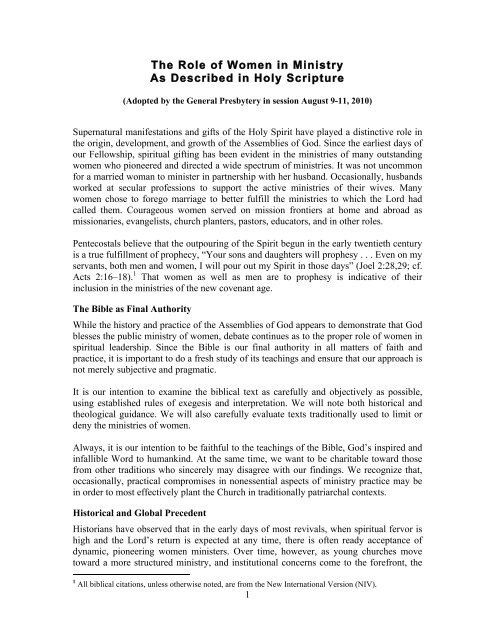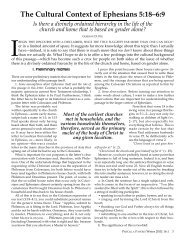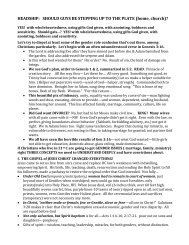The Role of Women in Ministry - Assemblies of God (USA)
The Role of Women in Ministry - Assemblies of God (USA)
The Role of Women in Ministry - Assemblies of God (USA)
Create successful ePaper yourself
Turn your PDF publications into a flip-book with our unique Google optimized e-Paper software.
<strong>The</strong> <strong>Role</strong> <strong>of</strong> <strong>Women</strong> <strong>in</strong> M<strong>in</strong>istry<br />
As Described <strong>in</strong> Holy Scripture<br />
(Adopted by the General Presbytery <strong>in</strong> session August 9-11, 2010)<br />
Supernatural manifestations and gifts <strong>of</strong> the Holy Spirit have played a dist<strong>in</strong>ctive role <strong>in</strong><br />
the orig<strong>in</strong>, development, and growth <strong>of</strong> the <strong>Assemblies</strong> <strong>of</strong> <strong>God</strong>. S<strong>in</strong>ce the earliest days <strong>of</strong><br />
our Fellowship, spiritual gift<strong>in</strong>g has been evident <strong>in</strong> the m<strong>in</strong>istries <strong>of</strong> many outstand<strong>in</strong>g<br />
women who pioneered and directed a wide spectrum <strong>of</strong> m<strong>in</strong>istries. It was not uncommon<br />
for a married woman to m<strong>in</strong>ister <strong>in</strong> partnership with her husband. Occasionally, husbands<br />
worked at secular pr<strong>of</strong>essions to support the active m<strong>in</strong>istries <strong>of</strong> their wives. Many<br />
women chose to forego marriage to better fulfill the m<strong>in</strong>istries to which the Lord had<br />
called them. Courageous women served on mission frontiers at home and abroad as<br />
missionaries, evangelists, church planters, pastors, educators, and <strong>in</strong> other roles.<br />
Pentecostals believe that the outpour<strong>in</strong>g <strong>of</strong> the Spirit begun <strong>in</strong> the early twentieth century<br />
is a true fulfillment <strong>of</strong> prophecy, “Your sons and daughters will prophesy . . . Even on my<br />
servants, both men and women, I will pour out my Spirit <strong>in</strong> those days” (Joel 2:28,29; cf.<br />
Acts 2:16–18). 1 That women as well as men are to prophesy is <strong>in</strong>dicative <strong>of</strong> their<br />
<strong>in</strong>clusion <strong>in</strong> the m<strong>in</strong>istries <strong>of</strong> the new covenant age.<br />
<strong>The</strong> Bible as F<strong>in</strong>al Authority<br />
While the history and practice <strong>of</strong> the <strong>Assemblies</strong> <strong>of</strong> <strong>God</strong> appears to demonstrate that <strong>God</strong><br />
blesses the public m<strong>in</strong>istry <strong>of</strong> women, debate cont<strong>in</strong>ues as to the proper role <strong>of</strong> women <strong>in</strong><br />
spiritual leadership. S<strong>in</strong>ce the Bible is our f<strong>in</strong>al authority <strong>in</strong> all matters <strong>of</strong> faith and<br />
practice, it is important to do a fresh study <strong>of</strong> its teach<strong>in</strong>gs and ensure that our approach is<br />
not merely subjective and pragmatic.<br />
It is our <strong>in</strong>tention to exam<strong>in</strong>e the biblical text as carefully and objectively as possible,<br />
us<strong>in</strong>g established rules <strong>of</strong> exegesis and <strong>in</strong>terpretation. We will note both historical and<br />
theological guidance. We will also carefully evaluate texts traditionally used to limit or<br />
deny the m<strong>in</strong>istries <strong>of</strong> women.<br />
Always, it is our <strong>in</strong>tention to be faithful to the teach<strong>in</strong>gs <strong>of</strong> the Bible, <strong>God</strong>’s <strong>in</strong>spired and<br />
<strong>in</strong>fallible Word to humank<strong>in</strong>d. At the same time, we want to be charitable toward those<br />
from other traditions who s<strong>in</strong>cerely may disagree with our f<strong>in</strong>d<strong>in</strong>gs. We recognize that,<br />
occasionally, practical compromises <strong>in</strong> nonessential aspects <strong>of</strong> m<strong>in</strong>istry practice may be<br />
<strong>in</strong> order to most effectively plant the Church <strong>in</strong> traditionally patriarchal contexts.<br />
Historical and Global Precedent<br />
Historians have observed that <strong>in</strong> the early days <strong>of</strong> most revivals, when spiritual fervor is<br />
high and the Lord’s return is expected at any time, there is <strong>of</strong>ten ready acceptance <strong>of</strong><br />
dynamic, pioneer<strong>in</strong>g women m<strong>in</strong>isters. Over time, however, as young churches move<br />
toward a more structured m<strong>in</strong>istry, and <strong>in</strong>stitutional concerns come to the forefront, the<br />
1 All biblical citations, unless otherwise noted, are from the New International Version (NIV).<br />
1
spiritual leadership <strong>of</strong> women is less readily accepted and church leadership tends to<br />
become predom<strong>in</strong>antly male.<br />
<strong>The</strong> experience <strong>of</strong> the <strong>Assemblies</strong> <strong>of</strong> <strong>God</strong> has been no exception. Notable women<br />
m<strong>in</strong>isters among the early Pentecostals <strong>in</strong>cluded Maria B. Woodworth-Etter, Aimee<br />
Semple McPherson, Alice Reynolds Flower, Anna Ziese, and Marie Burgess Brown. But<br />
even though women had great freedom to m<strong>in</strong>ister <strong>in</strong> the early days <strong>of</strong> the Fellowship, the<br />
proportion <strong>of</strong> women <strong>in</strong> leadership dropped dramatically beg<strong>in</strong>n<strong>in</strong>g <strong>in</strong> the early 1920s.<br />
More recently, the trend is aga<strong>in</strong> upward and the number <strong>of</strong> credentialed women is<br />
grow<strong>in</strong>g.<br />
Throughout their history, Pentecostals around the world have struggled to apply biblical<br />
truth <strong>in</strong> widely divergent cultural contexts. In some sett<strong>in</strong>gs, female spiritual leadership is<br />
readily accepted; <strong>in</strong> others, where women have limited m<strong>in</strong>istry, leadership posts are<br />
withheld from them. At times there is <strong>in</strong>consistency between the leadership a female<br />
missionary, for example, has at home and that which she has on the field. <strong>The</strong>re may also<br />
be a difference between her m<strong>in</strong>istry opportunities on the field and those <strong>of</strong> women <strong>in</strong> the<br />
culture she serves. Without doubt, particular cultures have <strong>in</strong>fluenced, and cont<strong>in</strong>ue to<br />
<strong>in</strong>fluence, the nature and extent <strong>of</strong> female leadership. While the Church must always be<br />
sensitive to cultural concerns, it must nonetheless consistently look to Scripture for<br />
pr<strong>in</strong>ciples and directions that rise above particular contextual practices.<br />
Biblical Examples <strong>of</strong> <strong>Women</strong> <strong>in</strong> M<strong>in</strong>istry<br />
Old Testament history <strong>in</strong>cludes accounts <strong>of</strong> strong female leadership <strong>in</strong> many roles. <strong>The</strong><br />
follow<strong>in</strong>g are strik<strong>in</strong>g examples: Miriam was a prophet to Israel dur<strong>in</strong>g the Exodus,<br />
alongside her brothers Moses and Aaron (Exodus 15:20). Deborah, both a prophet and a<br />
judge, directed Barak to lead the army <strong>of</strong> Israel <strong>in</strong>to successful combat aga<strong>in</strong>st Israel’s<br />
oppressors (Judges 4 to 5). Huldah, also a prophet, authenticated the scroll <strong>of</strong> the Law<br />
found <strong>in</strong> the temple and helped spark religious reform <strong>in</strong> the days <strong>of</strong> Josiah (2 K<strong>in</strong>gs<br />
22:14–20; 2 Chronicles 34:22–28).<br />
<strong>The</strong> New Testament also shows that women filled important m<strong>in</strong>istry roles <strong>in</strong> the Early<br />
Church. Tabitha (Dorcas) <strong>in</strong>itiated an effective benevolence m<strong>in</strong>istry (Acts 9:36). Philip’s<br />
four unmarried daughters were recognized prophets (Acts 21:8,9). Paul s<strong>in</strong>gled out two<br />
women, Euodia and Syntyche, as “women who have contended at my side <strong>in</strong> the cause <strong>of</strong><br />
the gospel, along with Clement and the rest <strong>of</strong> my fellow workers” (Philippians 4:2,3).<br />
Priscilla was another <strong>of</strong> Paul’s exemplary “fellow workers <strong>in</strong> Christ Jesus” (Romans<br />
16:3,4). In Romans 16, Paul greets numerous m<strong>in</strong>istry colleagues, a large number <strong>of</strong> them<br />
women. In these greet<strong>in</strong>gs, the word Paul uses to speak <strong>of</strong> the work (kopiaō), or labor, <strong>of</strong><br />
Mary, Tryphena, Tryphosa, and Persis (Romans 16:6,12) is one he uses extensively for<br />
the labor <strong>of</strong> m<strong>in</strong>istry (1 Cor<strong>in</strong>thians 16:16; 1 <strong>The</strong>ssalonians 5:12; 1 Timothy 5:17).<br />
Phoebe, a leader <strong>in</strong> the church at Cenchrea, was highly commended to the church at<br />
Rome by Paul (Romans 16:1,2). Unfortunately, translation biases have <strong>of</strong>ten obscured<br />
Phoebe’s position <strong>of</strong> leadership, call<strong>in</strong>g her a “servant” (NIV, NASB, ESV). Yet Phoebe<br />
was diakonos <strong>of</strong> the church at Cenchrea. Paul regularly used this term for a m<strong>in</strong>ister or<br />
leader <strong>of</strong> a congregation and applied it specifically to Jesus Christ, Tychicus, Epaphras,<br />
2
Timothy, and to his own m<strong>in</strong>istry. Depend<strong>in</strong>g on the context, diakonos is usually<br />
translated “deacon” or “m<strong>in</strong>ister.” Though some translators have chosen the word<br />
deaconess (e.g., RSV, because Phoebe was female), the Greek diakonos is a mascul<strong>in</strong>e<br />
noun. <strong>The</strong>refore, it seems likely that diakonos was the designation for an <strong>of</strong>ficial<br />
leadership position <strong>in</strong> the Early Church and the proper translation for Phoebe’s role is<br />
“deacon” (TNIV, NLT, NRSV) or “m<strong>in</strong>ister.”<br />
Moreover, a number <strong>of</strong> translations reflect similar biases by referr<strong>in</strong>g to Phoebe as hav<strong>in</strong>g<br />
been a “great help” (NIV) or “helper” (NASB) <strong>of</strong> many, <strong>in</strong>clud<strong>in</strong>g Paul himself (Romans<br />
16:2). <strong>The</strong> Greek term here is prostatis, better translated by the NRSV as “benefactor”<br />
with its overtones <strong>of</strong> equality and leadership.<br />
Junia was identified by Paul as an apostle (Romans 16:7). Beg<strong>in</strong>n<strong>in</strong>g <strong>in</strong> the thirteenth<br />
century, a number <strong>of</strong> scholars and translators mascul<strong>in</strong>ized her name to Junias, apparently<br />
unwill<strong>in</strong>g to admit that there was a female apostle. However, the name Junia is found<br />
more than 250 times <strong>in</strong> Rome alone, while the mascul<strong>in</strong>e form Junias is unknown <strong>in</strong> any<br />
Greco-Roman source. Paul clearly was a strong advocate <strong>of</strong> women <strong>in</strong> m<strong>in</strong>istry.<br />
<strong>The</strong>se <strong>in</strong>stances <strong>of</strong> women fill<strong>in</strong>g leadership roles <strong>in</strong> the Bible should be taken as a<br />
div<strong>in</strong>ely approved pattern, not as exceptions to div<strong>in</strong>e decrees. Even a limited number <strong>of</strong><br />
women with scripturally commended leadership roles affirm that <strong>God</strong> does <strong>in</strong>deed call<br />
women to spiritual leadership.<br />
A Biblical Survey <strong>of</strong> the <strong>Role</strong> <strong>of</strong> <strong>Women</strong> <strong>in</strong> M<strong>in</strong>istry<br />
Of primary importance <strong>in</strong> def<strong>in</strong><strong>in</strong>g the scriptural role <strong>of</strong> women <strong>in</strong> m<strong>in</strong>istry is the biblical<br />
mean<strong>in</strong>g <strong>of</strong> “m<strong>in</strong>istry”. Of Christ our great model, it was said, “For even the Son <strong>of</strong> Man<br />
did not come to be served [diakoneō], but to serve [diakoneō], and to give his life as a<br />
ransom for many” (Mark 10:45; cf. Matthew 20:28). <strong>The</strong> New Testament leadership<br />
modeled by Jesus portrays the spiritual leader as a servant, whether male or female. <strong>The</strong><br />
question <strong>of</strong> human authority is not <strong>of</strong> primary significance, though it naturally arises as<br />
organization and structure develop.<br />
Genesis 2:18–25<br />
Some expositors have taught that all women should be subord<strong>in</strong>ate to adult men because<br />
Eve was created after Adam to be his “helper” (NIV; “help meet”, KJV). Yet the word<br />
ēzer (“helper”) is never used <strong>in</strong> the Hebrew Bible with a subord<strong>in</strong>ate mean<strong>in</strong>g. Seventeen<br />
out <strong>of</strong> the twenty times it is used, it refers to <strong>God</strong> as the helper. Eve was created to be a<br />
help (kenegdo) “suitable” or “correspond<strong>in</strong>g to” Adam, not a subord<strong>in</strong>ate.<br />
Some argue that <strong>God</strong> created men and women with different characteristics and desires,<br />
and that these differences expla<strong>in</strong> why leadership roles should be withheld from women.<br />
Others attribute these perceived differences to culture and social expectations imposed on<br />
children from birth to adulthood. Physical differences and dist<strong>in</strong>ctive biological functions<br />
are obvious; but it is only by implication that gender differences can be made to suggest<br />
leadership limitations.<br />
3
Paul’s Emphasis on Charismatic M<strong>in</strong>istry<br />
M<strong>in</strong>istry <strong>in</strong> the New Testament is charismatic <strong>in</strong> nature. It is made possible and energized<br />
as the Holy Spirit sovereignly distributes spiritual gifts (charismata) to each member <strong>of</strong><br />
the body <strong>of</strong> Christ (Romans 12:6–8; 1 Cor<strong>in</strong>thians 12:7–11,27,28; Ephesians 4:7–12;<br />
1 Peter 4:10–11). While some gifts are a spontaneous work <strong>of</strong> the Spirit and others are<br />
recognized m<strong>in</strong>istry gifts to the Body, all are given for service without regard to gender<br />
differentiation. For example, the gift <strong>of</strong> prophecy is explicitly for both men and women:<br />
“Your sons and your daughters will prophesy” (Acts 2:17). <strong>The</strong> New Testament confirms<br />
that women received and exercised this gift <strong>of</strong> the Spirit (Acts 21:9; 1 Cor<strong>in</strong>thians 11:5).<br />
If Peter found certa<strong>in</strong> statements by Paul hard to understand (2 Peter 3:16), it is no<br />
surprise that we, removed by nearly two thousand additional years <strong>of</strong> history, would<br />
share his struggle <strong>in</strong> <strong>in</strong>terpret<strong>in</strong>g some Paul<strong>in</strong>e passages. While the orig<strong>in</strong>al audiences<br />
were familiar with the problems that Paul addressed, we are left to reconstruct them and<br />
apply his prescriptions as best we can <strong>in</strong> light <strong>of</strong> the larger context <strong>of</strong> his letters and<br />
biblical revelation. And we, like Peter (2 Peter 3:15), must respect and love our brothers<br />
and sisters who hold alternative <strong>in</strong>terpretations on issues that are not critical to our<br />
salvation or stand<strong>in</strong>g before <strong>God</strong>. We only request that those <strong>in</strong>terpretations be expressed<br />
and practiced <strong>in</strong> love and consideration for all <strong>of</strong> <strong>God</strong>'s children, both men and women.<br />
First Cor<strong>in</strong>thians 11:3–12<br />
<strong>The</strong> statement that “the man is the head <strong>of</strong> the woman” has for centuries been used to<br />
justify the practice <strong>of</strong> male superiority and to exclude women from spiritual leadership.<br />
Two alternative translations for kephalē (“head”), debated widely by contemporary<br />
evangelical scholars, are (1) “authority over” and (2) “source” or “orig<strong>in</strong>.” Both mean<strong>in</strong>gs<br />
are found <strong>in</strong> literature <strong>of</strong> Paul’s time.<br />
Tak<strong>in</strong>g the passage as a whole, the second mean<strong>in</strong>g fits as well as or better than the first<br />
mean<strong>in</strong>g, lead<strong>in</strong>g to the summary statement <strong>of</strong> verse 12: “As woman came from man, so<br />
also man is born <strong>of</strong> woman. But everyth<strong>in</strong>g comes from <strong>God</strong>.” Even the relationship<br />
between the eternal Son and the Father—“the head <strong>of</strong> Christ is <strong>God</strong>” (11:3)—fits better<br />
as “source” than “authority over” (cf. John 8:42). Without attempt<strong>in</strong>g def<strong>in</strong>itively to<br />
resolve this debate, we do not f<strong>in</strong>d sufficient evidence <strong>in</strong> kephalē to deny leadership roles<br />
to women (<strong>in</strong> light <strong>of</strong> biblical examples <strong>of</strong> women <strong>in</strong> positions <strong>of</strong> spiritual authority, and<br />
<strong>in</strong> light <strong>of</strong> the whole counsel <strong>of</strong> Scripture).<br />
First Cor<strong>in</strong>thians 14:34–36<br />
<strong>The</strong>re are only two passages <strong>in</strong> the entire New Testament that might seem to conta<strong>in</strong> a<br />
prohibition aga<strong>in</strong>st the m<strong>in</strong>istry <strong>of</strong> women (1 Cor<strong>in</strong>thians 14:34 and 1 Timothy 2:12).<br />
S<strong>in</strong>ce these must be placed alongside Paul’s other statements and practices, they can<br />
hardly be absolute, unequivocal prohibitions <strong>of</strong> the m<strong>in</strong>istry <strong>of</strong> women. Instead, they<br />
seem to be deal<strong>in</strong>g with specific, local problems that needed correction. <strong>The</strong>refore, Paul’s<br />
consistent affirmation <strong>of</strong> m<strong>in</strong>ister<strong>in</strong>g women among his churches must be seen as his true<br />
perspective, rather than the apparent prohibitions <strong>of</strong> these two passages, themselves<br />
subject to conflict<strong>in</strong>g <strong>in</strong>terpretation.<br />
4
<strong>The</strong>re are various <strong>in</strong>terpretations <strong>of</strong> what Paul was limit<strong>in</strong>g when he said, “women should<br />
rema<strong>in</strong> silent <strong>in</strong> the churches. <strong>The</strong>y are not allowed to speak” (1 Cor<strong>in</strong>thians 14:34). Paul<br />
uses a word to limit the speech <strong>of</strong> women (sigatō) that previously has been used to limit<br />
the speech <strong>of</strong> those speak<strong>in</strong>g <strong>in</strong> tongues if there is no <strong>in</strong>terpretation (1 Cor<strong>in</strong>thians 14:28)<br />
and prophets if a prophecy is given to another person (v. 30). It is only under such<br />
specific circumstances that the speech <strong>of</strong> tongues speakers, prophets, and women are to<br />
be silenced <strong>in</strong> the church. Under what circumstances then, is the speech <strong>of</strong> women to be<br />
limited?<br />
Options <strong>in</strong>clude (1) chatter <strong>in</strong> public services, (2) ecstatic disruptions, (3) certa<strong>in</strong><br />
authoritative m<strong>in</strong>istries (such as judg<strong>in</strong>g prophecies), and (4) ask<strong>in</strong>g questions dur<strong>in</strong>g the<br />
service. It is apparent that Paul permitted women both to pray and prophesy <strong>in</strong> public<br />
worship at Cor<strong>in</strong>th (1 Cor<strong>in</strong>thians 11:5). Moreover, Paul advised that those who prophesy<br />
(evidently <strong>in</strong>clud<strong>in</strong>g women) should be among the ones to judge prophecies<br />
(1 Cor<strong>in</strong>thians 14:29). <strong>The</strong>refore, as with Paul’s constra<strong>in</strong>ts on both men and women<br />
tongues speakers and prophets, it may be that Paul’s additional constra<strong>in</strong>ts on women<br />
have to do with other forms <strong>of</strong> disruptive speech.<br />
While the precise nature <strong>of</strong> Paul’s prohibition <strong>in</strong> this text is a matter <strong>of</strong> ongo<strong>in</strong>g study, we<br />
do conclude that it does not prohibit female leadership, but like the rest <strong>of</strong> the chapter, it<br />
admonishes that “everyth<strong>in</strong>g should be done <strong>in</strong> a fitt<strong>in</strong>g and orderly way” (1 Cor<strong>in</strong>thians<br />
14:40).<br />
First Timothy 2:11–15<br />
<strong>The</strong> mean<strong>in</strong>g and application <strong>of</strong> Paul's statement, “I do not permit a woman to teach or to<br />
have authority over a man; she must be silent” (1 Timothy 2:12), have puzzled<br />
<strong>in</strong>terpreters and resulted <strong>in</strong> a variety <strong>of</strong> positions on the role <strong>of</strong> women <strong>in</strong> m<strong>in</strong>istry and<br />
spiritual leadership.<br />
From the above survey <strong>of</strong> passages on exemplary women <strong>in</strong> m<strong>in</strong>istry, it is clear that Paul<br />
recognized the m<strong>in</strong>istry <strong>of</strong> women. <strong>The</strong>re were obvious problems <strong>in</strong> Ephesus, some<br />
relat<strong>in</strong>g to women. Some women were evidently given to immodest apparel and<br />
adornment (1 Timothy 2:9). <strong>The</strong> younger widows were “<strong>in</strong>to the habit <strong>of</strong> be<strong>in</strong>g idle . . .<br />
And not only do they become idlers, but also gossips and busybodies, say<strong>in</strong>g th<strong>in</strong>gs they<br />
ought not to” (1 Timothy 5:13). In his second letter to Timothy, Paul warned aga<strong>in</strong>st<br />
depraved persons (possibly <strong>in</strong>clud<strong>in</strong>g women) who manipulated “weak-willed,” or<br />
“gullible,” women (2 Timothy 3:6).<br />
A read<strong>in</strong>g <strong>of</strong> the entire passage <strong>of</strong> 1 Timothy 2:9–15 strongly suggests that Paul was<br />
giv<strong>in</strong>g Timothy advice about deal<strong>in</strong>g with some heretical teach<strong>in</strong>gs and practices<br />
specifically <strong>in</strong>volv<strong>in</strong>g women <strong>in</strong> the church at Ephesus. <strong>The</strong> heresy may have been so<br />
serious that he had to say about the Ephesian women, “I am not allow<strong>in</strong>g women to teach<br />
or have authority over a man.” Other passages show that such exclusion was not<br />
normative <strong>in</strong> Paul’s m<strong>in</strong>istry.<br />
5
First Timothy 3:1–13<br />
This entire passage has been held by some to confirm that all leaders and authorities <strong>in</strong><br />
the Early Church were supposed to be males. <strong>The</strong> passage deals primarily with male<br />
leadership, most likely because <strong>of</strong> majority practice and expectations. But there is also<br />
significant support for female leadership.<br />
Typical <strong>of</strong> modern English versions, the New International Version translates verse 11,<br />
“In the same way, their wives are to be women worthy <strong>of</strong> respect”. <strong>The</strong> NIV translators<br />
arbitrarily decided that the verse refers to the wives <strong>of</strong> deacons (even though there is no<br />
reference <strong>in</strong> the preced<strong>in</strong>g qualifications <strong>of</strong> elders to their wives).<br />
However, the word translated “wives” is the plural <strong>of</strong> the Greek word gynē which can be<br />
translated as either “woman” or “wife” depend<strong>in</strong>g on the context. Recogniz<strong>in</strong>g this, the<br />
NIV translators did <strong>in</strong>clude the word “deaconesses” as an alternate read<strong>in</strong>g <strong>in</strong> their<br />
footnotes. But the NASB and the NRSV render the plural form <strong>of</strong> gynē as “women.”<br />
Thus, literally, the verse is address<strong>in</strong>g the qualifications <strong>of</strong> women <strong>in</strong> spiritual leadership<br />
who, <strong>in</strong> this context, might easily be called “deacons.”<br />
Although the first-century cultural milieu produced a primarily male church leadership,<br />
this passage along with other biblical evidence <strong>of</strong> female spiritual leadership (e.g., Acts<br />
21:9; Romans 16:1–15 ; Philippians 4:2,3) demonstrates that female leadership was not<br />
prohibited, either for Paul’s day or for today. Passages that imply most leaders were male<br />
may not be taken to say that all leaders were male, s<strong>in</strong>ce the biblical record speaks<br />
approv<strong>in</strong>gly <strong>of</strong> numerous female leaders.<br />
6
Galatians 3:28<br />
Those who oppose allow<strong>in</strong>g women to hold positions <strong>of</strong> spiritual leadership place<br />
contextual limitations on Galatians 3:28, “<strong>The</strong>re is neither Jew nor Greek, slave nor free,<br />
male nor female, for you are all one <strong>in</strong> Christ Jesus.”<br />
Some <strong>in</strong>terpreters restrict the mean<strong>in</strong>g <strong>of</strong> this triad to salvation by faith or oneness <strong>in</strong><br />
Christ. That truth is certa<strong>in</strong>ly articulated throughout Scripture. Yet the verse carries a r<strong>in</strong>g<br />
<strong>of</strong> universal application for all our relationships, not just an assurance that anyone can<br />
come to Christ. “Neither Jew nor Greek, slave nor free, male nor female”—these are<br />
basic relationship pr<strong>in</strong>ciples to which faithful followers <strong>of</strong> Christ must give highest<br />
priority.<br />
<strong>The</strong> <strong>God</strong> <strong>of</strong> the Bible “does not show favoritism” (Romans 2:11; cf. also 2 Samuel 14:14;<br />
2 Chronicles 19:7; Acts 10:34; Ephesians 6:9). He calls whom He will and gives gifts and<br />
m<strong>in</strong>istries as He chooses; humans must not put limitations on div<strong>in</strong>e prerogatives. <strong>The</strong><br />
stra<strong>in</strong>ed relationship between Adam and Eve, <strong>in</strong>clud<strong>in</strong>g the statement that “he will rule<br />
over you” (Genesis 3:16), comes as a result <strong>of</strong> the curse, mak<strong>in</strong>g it clear that this was not<br />
a part <strong>of</strong> <strong>God</strong>’s orig<strong>in</strong>al and durable design for humank<strong>in</strong>d. In Christ we are truly set free<br />
from s<strong>in</strong> and its curse, which separate us from <strong>God</strong> and each other and cause us to elevate<br />
or demean accord<strong>in</strong>g to race, social stand<strong>in</strong>g, or gender.<br />
<strong>The</strong>refore We Conclude<br />
After exam<strong>in</strong><strong>in</strong>g the various translations and <strong>in</strong>terpretations <strong>of</strong> biblical passages relat<strong>in</strong>g<br />
to the role <strong>of</strong> women <strong>in</strong> the first-century church, and desir<strong>in</strong>g to apply biblical pr<strong>in</strong>ciples<br />
to contemporary church practice, we conclude that we cannot f<strong>in</strong>d conv<strong>in</strong>c<strong>in</strong>g evidence<br />
that the m<strong>in</strong>istry <strong>of</strong> women is restricted accord<strong>in</strong>g to some sacred or immutable pr<strong>in</strong>ciple.<br />
We are aware that the m<strong>in</strong>istry and leadership <strong>of</strong> women are not accepted by some<br />
<strong>in</strong>dividuals, both with<strong>in</strong> and outside the Christian community. We condemn all prejudice<br />
and self-promotion, by men or women. <strong>The</strong> existence <strong>of</strong> bigotry aga<strong>in</strong>st women <strong>in</strong> our<br />
world, and all too <strong>of</strong>ten <strong>in</strong> the church, cannot be denied. But there is no place for such an<br />
attitude <strong>in</strong> the body <strong>of</strong> Christ. We acknowledge that attitudes <strong>of</strong> secular society, based on<br />
long-stand<strong>in</strong>g practice and tradition, have <strong>in</strong>fluenced the application <strong>of</strong> biblical pr<strong>in</strong>ciples<br />
to local circumstances. We desire wisely to respect yet help redeem cultures that are at<br />
variance with K<strong>in</strong>gdom pr<strong>in</strong>ciples. Like Paul, we affirm that the Great Commission takes<br />
priority over every other consideration. We must reach men and women for Christ, no<br />
matter what their cultural or ethnic customs may be. <strong>The</strong> message <strong>of</strong> redemption has been<br />
carried to remote parts <strong>of</strong> the world through the m<strong>in</strong>istry <strong>of</strong> dedicated, Spirit-filled men<br />
and women. A believer’s gifts and ano<strong>in</strong>t<strong>in</strong>g should still today make a way for his or her<br />
m<strong>in</strong>istry. <strong>The</strong> Pentecostal m<strong>in</strong>istry is not a pr<strong>of</strong>ession to which men or women merely<br />
aspire; it must always be a div<strong>in</strong>e call<strong>in</strong>g, confirmed by the Spirit with a special gift<strong>in</strong>g.<br />
<strong>The</strong> <strong>Assemblies</strong> <strong>of</strong> <strong>God</strong> has been blessed and must cont<strong>in</strong>ue to be blessed by the m<strong>in</strong>istry<br />
<strong>of</strong> <strong>God</strong>’s gifted and commissioned daughters. <strong>The</strong> Bible repeatedly affirms that <strong>God</strong><br />
pours out His Spirit upon both men and women and thereby gifts both sexes for m<strong>in</strong>istry<br />
7
<strong>in</strong> His Church. <strong>The</strong>refore, we must cont<strong>in</strong>ue to affirm the gifts <strong>of</strong> women <strong>in</strong> m<strong>in</strong>istry and<br />
spiritual leadership.<br />
Surely, the enormous challenge <strong>of</strong> the Great Commission to “go and make disciples <strong>of</strong> all<br />
nations” (Matthew 28:19) requires the full deployment <strong>of</strong> all <strong>God</strong>’s Spirit-gifted<br />
m<strong>in</strong>isters, both men and women.<br />
Bible Translations and Versions Abbreviations<br />
NIV New International Version<br />
NASB <strong>The</strong> New American Standard Bible<br />
ESV English Standard Version<br />
RSV <strong>The</strong> Revised Standard Version<br />
TNIV Today’s New International Version<br />
NLT New Liv<strong>in</strong>g Translation<br />
NRSV New Revised Standard Version<br />
8









